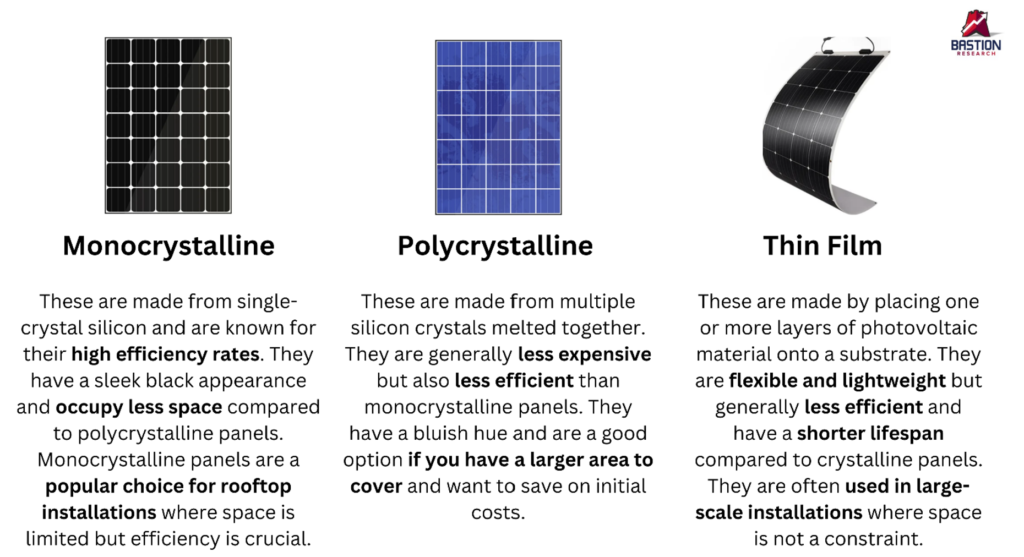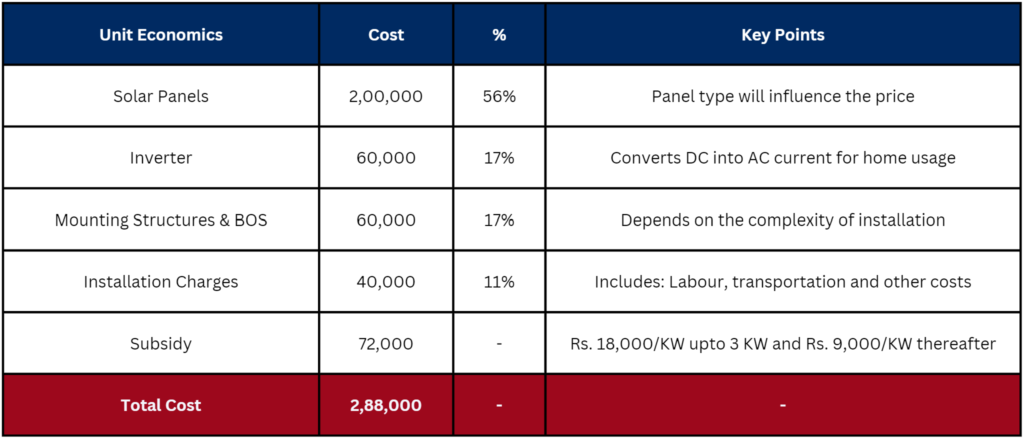
In this blog, we uncover the economics of Installing a Rooftop Solar Power System.
Many people saw their electricity bills skyrocket this summer due to record-high temperatures. If you didn’t feel this financial pinch, you probably have a solar power system on your roof. It’s not just households; many manufacturing companies are also installing their own solar plants to cut energy costs.
Before diving into today’s topic, let’s talk about how seriously the Indian government is taking solar power. They aim to increase the installed solar power capacity from 180 GW to 500 GW by 2030, which means a compounded growth of ~19%.
Mr Verma’s Dilemma
Let’s try and uncover the nuances of installing a Rooftop Solar by take the case of Mr. Verma, a resident of Ahmedabad who is now considering joining the solar revolution after seeing his soaring electricity bill.

Benefits of Installing Rooftop Solar
Let’s breakdown some numbers to understand the mechanics behind rooftop solar energy and explore the potential economic benefits for Mr. Verma.
Mr. Verma typically consumes 600-900 kWh/month, which is 30 kWh per day or 1.25 kWh every hour. At an average tariff of ~Rs.8/unit (varies from city to city and area to area) his monthly bill comes out to Rs. 7,200. Therefore, Mr. Verma ends up shelling out Rs. 7,200 per month on electricity.

Now that we know how much Mr. Verma spends on electricity monthly, let’s figure out the rooftop solar capacity he needs to install to completely offset his current monthly costs. But first, we need to understand an important concept: the Plant Load Factor (PLF).
Plant Load Factor (PLF)
In simple words, The Plant Load Factor (PLF) is a measure of how efficiently a power plant is being utilized. In the case of a Solar Power System, this depends on weather conditions and the efficiency of solar panels. Here is how PLF is calculated.

Typically, a rooftop solar system operates at a PLF which ranges from 15-25%. Assuming Mr Verma’s rooftop solar will operate at the higher end of 25%, a reverse calculation tells us that he will have to install a rooftop solar with an output capacity of 5 KW per hour. Calculation below:

In summary, if Mr Verma installs a Rooftop Solar that generates 5 kw of energy per hour and operates at a 25% capacity (PLF), he will be able to bring down his current energy cost to NIL assuming his usage pattern remains the same. Sounds great. Right?. But don’t get happy just yet, as we have still only discussed the BENEFITS and associated COSTS are yet to discussed.
Costs associated with Installing Rooftop Solar
Well, for setting up a solar plant, the cost of solar panels is the most significant chunk of the expense, typically making up about 50% to 60% of the total cost. Today, a variety of solar panel available, each with its own characteristics and efficiency.
These include Monocrystalline Solar Panels, Polycrystalline Solar Panels, and Thin Film Solar Panels, among others. Each type differs in terms of performance, durability, and cost-effectiveness, offering consumers like Mr. Verma different options to consider based on their specific needs and budget constraints.

Mr Verma decides to proceed with Monocrystalline Solar panels, as he has limited rooftop space and wants high efficiency.
Let’s have a quick look at the total cost of setting up the solar plant.

Savings
Assuming savings of Rs. 7,200/month, Mr Verma can save Rs. 84,000 annually, implying a Payback Period of 3.3 years. In short, Mr Verma can recoup his initial investment in 3.3 years.
(Please note, this is calculated assuming consistent consumption.)
Return on Investment (ROI)
The total LIFESPAN of a typical Rooftop Solar Panel is in the range of 25-30 years. Assuming the lower end of this range, over its lifetime of 25 years, the total savings Mr Verma could make from the solar panels could exceed Rs. 20 Lakhs. This represents a return of over 7x the initial investment.
On a lighter note, investing in solar panels could also be an excellent investment, not just stocks that qualify under the Solar Power Theme.
✍🏻Author of this newsletter – Shiwani Kumari (LINKEDIN)
📄Shiwani Kumari is an equity research analyst at Monarch Networth Capital Ltd, covering multiple companies operating in the Solar Energy sector.
Fin Meme of the Week
Let’s cheer for Team India






